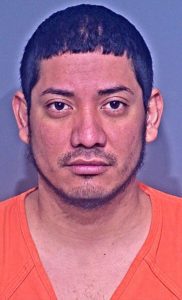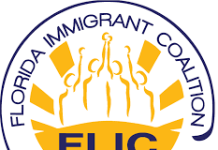Fiscalía del Estado de EE.UU.: Nacional hondureño sentenciado a nueve años por esquema masivo de fraude migratorio
MOBILE, AL – Un ciudadano hondureño que vive en Pensacola, Florida, ha sido sentenciado a nueve años de prisión federal por orquestar un plan masivo de fraude migratorio que involucró a más de 425 víctimas en todo el país.
Según documentos judiciales, Franklin Javier Pérez Ríos, de 29 años, orquestó un plan de fraude desde el 2017 hasta el 2023 en el que afirmaba poder brindar servicios relacionados con la inmigración a ciudadanos extranjeros que vivían en los Estados Unidos. Como parte de este plan, Pérez Ríos, que no tenía calificaciones legítimas, fingió en varias ocasiones ser un funcionario actual del gobierno de los Estados Unidos, un ex funcionario del gobierno de los Estados Unidos, un abogado de inmigración, un asistente legal u otro profesional de servicios de inmigración. Creyendo que Pérez-Ríos podría ayudarlos a obtener un estatus legal en los Estados Unidos, cientos de víctimas en Florida, Alabama y al menos otros catorce estados pagaron a Pérez-Ríos miles de dólares cada uno por lo que creían que eran servicios de inmigración legítimos y legales. Las víctimas extranjeras contrataron a Pérez Ríos con la esperanza de que pudiera ayudarles a obtener un estatus legal después de años de residir en los Estados Unidos.
Pérez Ríos no obtuvo el estatus para ninguna de las víctimas como prometió. Más bien, rutinariamente presentaba trámites de asilo ante el Servicio de Inmigración y Ciudadanía de los Estados Unidos (“USCIS”) en nombre de las víctimas, y luego les decía que tenían que viajar a California con él, donde estaban sujetos a exámenes médicos y vacunas. Ni los exámenes médicos ni los viajes a California formaban legítimamente parte del proceso de asilo. Para otras víctimas, Pérez Ríos no presentó ningún documento en su nombre a pesar de haber dicho que lo haría. Para que las víctimas creyeran que él estaba trabajando en su nombre, Pérez Ríos les proporcionó documentación falsificada supuestamente del gobierno de los Estados Unidos. Estos documentos falsificados llevaron a muchas víctimas a creer que habían obtenido estatus legal en los Estados Unidos cuando, en realidad, no era así.
Cada una de las víctimas le pagaron varios miles de dólares a Pérez Ríos, a menudo en efectivo, por sus falsos servicios de inmigración. Le hizo creer falsamente a las víctimas que gran parte de este dinero consistía en “honorarios” que debían pagar al
gobierno de los Estados Unidos, incluida una “tarifa de perdón” ficticia por ingresar ilegalmente a los Estados Unidos. Pérez-Ríos obtuvo al menos 2.8 millones de dólares de las víctimas durante este plan, y utilizó este dinero para apostar y financiar su lujoso estilo de vida.
Aproximadamente 50 víctimas asistieron a la audiencia de sentencia de Pérez Ríos el 8 de marzo, y muchas explicaron a la jueza del Tribunal de Distrito de los Estados Unidos, Kristi DuBose, cómo les afectó esta estafa. La mayoría de las víctimas eran de países de habla hispana y creían que Pérez Ríos era uno de los suyos, alguien en quien podían confiar en sus esfuerzos por obtener estatus legal. Las víctimas explicaron que Pérez Ríos se aprovechó de esta confianza y explotó su ingenuidad con respecto al proceso de inmigración real. Muchas víctimas incumplieron plazos importantes para solicitar asilo porque creían que Pérez Ríos lo estaba haciendo en su nombre. Todas las víctimas que hablaron en la audiencia de sentencia describieron cómo Pérez Ríos abusó de su confianza.
Pérez-Ríos se declaró culpable de nueve cargos de fraude electrónico asociados con el esquema, y los Estados Unidos recomendó una sentencia en el extremo superior del rango de las pautas de asesoramiento. La jueza DuBose estuvo de acuerdo con la recomendación de los Estados Unidos y condenó a Pérez Ríos a 108 meses de prisión seguidos de tres años de libertad supervisada. El juez DuBose dictó una sentencia de decomiso de dinero contra Pérez Ríos por más de $2.8 millones, que representa la cantidad de ganancias ilegales obtenidas de su plan. A Pérez Ríos también se le ordenó pagar casi 2.5 millones de dólares en restitución a las víctimas del fraude.
“Este acusado se aprovechó de las víctimas vulnerables y abusó de su confianza, tergiversando el proceso de inmigración de Estados Unidos para sus propios fines egoístas,” dijo el Fiscal Federal Sean P. Costello. “Al trabajar con nuestros socios en el cumplimiento de la ley, llevaremos ante la justicia a cualquiera que intente aprovecharse del sistema de inmigración para llenarse los bolsillos.”
Homeland Security Investigations (HSI) Mobile y Pensacola dirigieron esta investigación en colaboración con la Dirección de Seguridad Nacional y Detección de Fraudes (FDNS) de USCIS. Varias otras agencias ayudaron a HSI en esta investigación, incluido el Departamento de Aplicación de la Ley de Florida (FDLE), la Oficina de Operaciones de Campo de Aduanas y Protección Fronteriza de los Estados Unidos (USCBP), la Estación Móvil de la Patrulla Fronteriza de los Estados Unidos (USBP), el Departamento de Policía de Pensacola y el Servicio de Impuestos Internos (IRS) y la Patrulla de Caminos de Florida (FHP).
Si cree que Pérez-Ríos presentó una solicitud en su nombre, puede llamar a la línea directa de Servicio al Cliente de USCIS al 1-800-375-5283 y consultar sobre el estado de su solicitud de inmigración. La línea directa está operativa de 8 am a 8 pm, hora estándar del este (EST), de lunes a viernes. Si conoce su número de registro de extranjero (también conocido como número A) y/o número de recibo, puede verificar el estado de su caso en línea en https://www.uscis.gov/tools/checking-your-case- estado en línea. También debe actualizar su información de contacto para cualquier solicitud pendiente con USCIS. Puede encontrar información sobre cómo actualizar su dirección con USCIS en https://www.uscis.gov/addresschange.
US State Attorney’s Office: Honduran national sentenced to nine years for massive immigration fraud scheme
 MOBILE, AL – A Honduran national living in Pensacola, Florida has been sentenced to nine years in federal prison for orchestrating a massive immigration fraud scheme involving over 425 victims nationwide.
MOBILE, AL – A Honduran national living in Pensacola, Florida has been sentenced to nine years in federal prison for orchestrating a massive immigration fraud scheme involving over 425 victims nationwide.
According to court documents, Franklin Javier Perez-Rios, age 29, orchestrated a fraud scheme from 2017 through 2023 in which he claimed to be able to provide immigration-related services to foreign nationals living in the United States. As part of this scheme, Perez-Rios, who had no legitimate qualifications, pretended at various times to be a current United States government official, a former United States government official, an immigration attorney, a paralegal, or other immigration services professional. Believing that Perez-Rios could help them gain lawful status in the United States, hundreds of victims in Florida, Alabama, and at least fourteen other states paid Perez-Rios thousands of dollars each for what they believed were legitimate, legal immigration services. Foreign national victims hired Perez-Rios with the hope that he could help them achieve legal status after years of residing in the United States.
Perez-Rios did not obtain status for any of the victims as he promised. Rather, he routinely filed asylum paperwork with United States Citizenship and Immigration Services (“USCIS”) on the victims’ behalf, and then told them that they had to travel to California with him where they were subject to medical examinations and vaccinations. Neither the medical examinations nor the trips to California were legitimately part of the asylum process. For other victims, Perez-Rios filed no paperwork on their behalf despite saying he would. To keep the victims believing he was working on their behalf, Perez-Rios provided them with forged documentation supposedly from the United States Government. These forged documents led many victims to believe that they had obtained legal status in the United States when, in fact, they had not.
Victims paid Perez-Rios several thousand dollars each, often in cash, for his sham immigration services. Victims were falsely led to believe that much of this money consisted of “fees” that they had to pay to the United States government, including a fictitious “forgiveness fee” for illegally entering the United States. Perez-Rios profited at least $2.8 million dollars from victims during this scheme, and he used this money for gambling and to fund his lavish lifestyle.
Approximately 50 victims attended Perez-Rios’s sentencing hearing on March 8, and many explained to U.S. District Court Judge Kristi DuBose how this scheme affected them. Most victims were from Spanish speaking countries, and they believed that Perez-Rios was one of their own, someone they could trust in their efforts to obtain legal status. The victims explained that Perez-Rios preyed on this trust and exploited their naivete concerning the actual immigration process. Many victims missed important deadlines to apply for asylum because they believed Perez-Rios was doing so on their behalf. All the victims who spoke at the sentencing hearing described how Perez-Rios abused their trust.
Perez-Rios pleaded guilty to nine counts of wire fraud associated with the scheme, and the United States recommended a sentence at the high end of the advisory guidelines range. Judge DuBose agreed with the United States’ recommendation and sentenced Perez-Rios to 108 months in prison followed by three years of supervised release. Judge DuBose entered a forfeiture money judgment against Perez-Rios for over $2.8 million, representing the amount of illegal proceeds obtained from his scheme. Perez-Rios was also ordered to pay nearly $2.5 million dollars in restitution to victims of his scheme.
“This defendant exploited vulnerable victims and abused their trust, twisting the United States immigration process to his own selfish ends,” said United States Attorney Sean P. Costello. “Working with our partners in law enforcement, we will bring to justice anyone who tries to take advantage of the immigration system to line their own pockets.”
Homeland Security Investigations (HSI) Mobile and Pensacola led this investigation in collaboration with USCIS’s Fraud Detection and National Security Directorate (FDNS). Several other agencies assisted HSI in this investigation including the Florida Department of Law Enforcement (FDLE), United States Customs and Border Protection (USCBP) Office of Field Operations, United States Border Patrol (USBP) Mobile Station, Pensacola Police Department, Internal Revenue Service (IRS), and the Florida Highway Patrol (FHP).
If you believe Perez-Rios filed an application on your behalf, you can call the USCIS Customer Service hotline at 1-800-375-5283 and inquire on the status of your immigration application. The hotline is operational from 8 am to 8 pm Eastern Standard Time (EST) Monday through Friday. If you know your Alien Registration number (also referred to as your A Number) and/or receipt number, you can check the status of your case online at https://www.uscis.gov/tools/checking-your-case-status-online. You should also update your contact information for any pending applications with USCIS. Information on how to update your address with USCIS can be found at https://www.uscis.gov/addresschange.
















